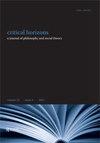Vox populi, vox neminis: Crowds, Interactivity and the Fate of Communication
IF 0.4
Q3 SOCIAL SCIENCES, INTERDISCIPLINARY
引用次数: 0
Abstract
ABSTRACT Philosophy’s engagement with mass media has often been ambiguous: many critical theorists, from Benjamin to Bourdieu, recognised the emancipatory potential of modern communication technologies, but they also denounced the economic, political and ideological forces at work in the creation and dissemination of public opinion. Looking at different media, these authors emphasised the dialectical tension between the plurality of the public sphere and different forms of control and manipulation. In the present paper, I argue that this line of criticism, albeit important, is no longer sufficient. I claim that contemporary forms of communication, defined by a unique emphasis on interactivity, cannot be analysed simply in terms of the opposition between dominant and marginalised agents or discourses. In its most extreme form, interactivity leads to an implosion of the distinction between the sources and the targets of the information flow, which calls into question the very possibility of a meaningful communicative exchange. To clarify the nature of this phenomenon, I retrace the evolution of modern political communication, from live speeches to digital platforms and social networks, and discuss its implications for recent debates on political authority, participation and representation.Vox populi,Vox neminis:人群、互动与传播的命运
哲学与大众传媒的接触往往是模棱两可的:许多批判理论家,从本雅明到布迪厄,都认识到现代传播技术的解放潜力,但他们也谴责在公众舆论的创造和传播中起作用的经济、政治和意识形态力量。在审视不同的媒介时,这些作者强调了公共领域的多元性与不同形式的控制和操纵之间的辩证张力。在本文中,我认为,这种批评路线,虽然重要,不再是充分的。我认为,当代的交流形式,由对互动性的独特强调所定义,不能简单地根据主导和边缘化代理人或话语之间的对立来分析。在其最极端的形式下,互动性导致信息流的来源和目标之间的区别的内爆,这就对有意义的交流的可能性提出了质疑。为了澄清这一现象的本质,我追溯了现代政治传播的演变,从现场演讲到数字平台和社交网络,并讨论了它对最近关于政治权威、参与和代表的辩论的影响。
本文章由计算机程序翻译,如有差异,请以英文原文为准。
求助全文
约1分钟内获得全文
求助全文

 求助内容:
求助内容: 应助结果提醒方式:
应助结果提醒方式:


